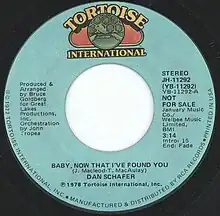Don Davis | |
|---|---|
| Birth name | Donald Davis |
| Born | October 25, 1938 Detroit, Michigan, US |
| Died | June 5, 2014 (aged 75) West Bloomfield Township, Michigan, US |
| Occupation(s) | Record producer, songwriter, guitarist, banking executive |
| Years active | Mid-1950s–1980s |
Donald Davis (October 25, 1938 – June 5, 2014) was an American record producer, songwriter and guitarist who combined a career in music with one in banking.[1]
Biography
Born in Detroit, he started playing music in the mid-1950s and after leaving Central High School formed his own jazz group, the Don Davis Trio, before becoming a session musician.[2] He played guitar for many Detroit record labels, including Golden World and Ric-Tic, as well as on early Motown records such as the hits, "Money (That's What I Want)" by Barrett Strong and Mary Wells' "Bye Bye Baby".[3]
He moved on to writing and producing records in Detroit and then joined Stax Records in Memphis, aiming to achieve a fusion of the Stax and Motown sounds.[2] He achieved his first major success as a songwriter and producer in 1968 with Johnnie Taylor’s hit "Who's Making Love", which reached no.1 on the Billboard Hot R&B Singles chart and no.5 on the Billboard Hot 100.[4][5] Davis also played guitar on the track, together with Steve Cropper.[2] He worked with Taylor on many of his hits in the 1970s, including the 1971 R&B no.1 hit "Jody's Got Your Girl and Gone", which Davis co-wrote.[2] Later, in 1976, he also co-wrote and produced Taylor's "Disco Lady", which spent four weeks at no.1 on the Billboard Hot 100 and six weeks on the Billboard R&B chart in the US. It was the first single to be certified platinum by the RIAA.[6]

Davis set up his own record production and music publishing companies, called Groovesville,[7][8] which are still operating. In 1971, he bought one of Detroit's premier recording studios, United Sound,[9][10] used by a host of musicians including George Clinton, Aretha Franklin, The Dramatics, The Dells, Carla Thomas, Michael Henderson, David Ruffin and Johnnie Taylor.[3][11] He also used the Muscle Shoals Sound Studio in Alabama to record the basic rhythm tracks on some of his productions.[12]
In 1975, Davis started and headed the RCA-distributed Detroit-based record label, Tortoise International[13] which included artists, First Fire, The Rockets, the 1978 comeback album by The Skyliners, as well as the 1978 Dan Schafer version of the 1960s re-make "Baby Now That I've Found You" which was re-released in 2012 on the CD Perhaps..the Very Best of Dan Schafer.[14] In 1977, Davis produced the Billy Davis, Jr. and Marilyn McCoo hit, "You Don't Have to Be a Star (To Be in My Show)".[15]
Davis also established himself as a banker, founding the First Independence Bank, the only African American-owned and operated commercial bank in Michigan in 1970.[3] He concentrated on his banking concern in later years, but continued to operate his music interests as well.
He lived in West Bloomfield Township, north of Detroit, and died after a short illness in June 2014, aged 75. He is survived by a wife and three children.[3]
References
- ↑ Edmonds, Ben. "Detroit banker Don Davis worked with Motown but made a name for himself with rival Stax". Detroit Free Press. Retrieved January 3, 2012.
- 1 2 3 4 Biography by Ed Hogan, Allmusic.com. Retrieved 7 June 2014
- 1 2 3 4 "Detroit music legend and banking entrepreneur Don Davis dies at age 75", The Detroit News, June 6, 2014 Archived June 7, 2014, at archive.today. Retrieved June 7, 2014
- ↑ Whitburn, Joel (2004). Top R&B/Hip-Hop Singles: 1942-2004. Record Research. p. 568.
- ↑ Finch, Graham. "Steve Mancha". /soulfuldetroit.com. Retrieved December 8, 2011.
- ↑ "History Of The Awards". RIAA.com. Archived from the original on 2007-07-01. Retrieved 2008-12-11.
- ↑ SoulfulDetroit - Groovesville Productions - Great Soul Music Recording Studios of Detroit
- ↑ Discogs - Groovesville Music - profile and discography
- ↑ SoulfulDetroit - United Sound Systems - Great Soul Music Recording Studios of Detroit
- ↑ Discogs - United Sound Studios - profile and discography
- ↑ Great Soul Music Recording Studios of Detroit Tour
- ↑ Olson, Peter B. "Muscle Shoals Sound Studios". Encyclopedia of Alabama. Retrieved December 8, 2011.
- ↑ "Tortoise International at Discogs". Discogs.com. Retrieved 2011-12-29.
- ↑ "'perhaps..the Very Best of Dan Schafer'". www.cdbaby.com. Retrieved 2012-03-05.
- ↑ "You don't have to be a Star". SuperSeventies.com. Retrieved 2011-12-29.